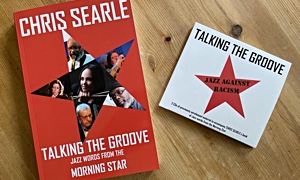Home » Jazz Articles » Book Review » Blues Legacies And Black Feminism
Blues Legacies And Black Feminism
For decades, the blues have been described by scholars and critics as everything but an historical antecedent for contemporary black feminism.
 Angela Y. Davis
Angela Y. Davis Blues Legacies And Black Feminism:
Gertrude "Ma" Rainey, Bessie Smith, and Billie Holiday
Vintage
1999
ISBN 0679771263
In her exploration of Gertrude "Ma" Rainey, Bessie Smith, and Billie Holiday, Angela Davis reveals how these women helped shape black and feminist consciousness as they defied the dominant culture. Challenging ideas of gender-based inferiority and bourgeois propriety, their songs expressed female self-possession and assertiveness, particularly in the realm of sexuality. Giving expression to issues rooted in their daily experiences as black women, their songs not only record a vibrant social history, but also represent the germination of the feminist consciousness-raising that would emerge decades later. Arguing that the long experience of slavery and segregation in the United States has led to black social consciousness being understandably over-determined by race, Davis seeks to expand upon this "one-dimensionality" by including issues of gender and class in the discourse. By examining the feminist contributions of these three working-class blues and jazz women, she reveals how their music resides not only within but also far beyond the borders of black culture and consciousness.
For decades, the blues have been described by scholars and critics as everything but an historical antecedent for contemporary black feminism. The blues have been primarily represented as a musical genre, an aesthetic, a sensibility, and a style, credited to post-slavery African-American culture. Davis argues that within Rainey and Smith's blues, and in Billie Holiday's transformative singing of innocuous lyrics, there were coded references to oppression and feminist resistance. Debunking the conventional notions of female domesticity and sexuality, the lives, lyrics and songs of these women inverted, rejected, and redefined images of (lack) womanhood in a patriarchal society. Pregnant with pronouncements on love and sexuality, their music "often blatantly contradicted mainstream [white middleclass] ideological assumptions regarding women and being in love."1 Rejecting the oppressive politics of victimization, which labeled them 'fallen women,' they embraced sexual freedom, which Ralph Ellison saw as pervading "their mysteriousness...their ability to imply far more than they stat outright their capacity to make the details of sex convey meanings which touch upon the metaphysical." 2
Together these women created musical caricatures of domesticity, signing paeans to their alternative vision of female identity that "reveal the beginnings of an oppositional attitude toward patriarchal ideology." Through their music, they created a cultural space for the development of a community consciousness among black working class women, free from the oppressive imperatives of bourgeois notions of sexual purity and 'true womanhood'." Their music undoubtedly generated a feeling of exhilaration and freedom among those who had been chained for centuries by their slave masters, only to be re-shackled to white bourgeois ideological assumptions that were flagrantly incongruous to the social realities of most black women's social. In defiance of a white middleclass male hegemonic ideology, their music celebrated black women's sexual desires, exploits and autonomy, reveling in the destabilizing power over men that their sexual self-ownership offered. Bessie Smith's "Down Hearted Blues," a song filled with thinly veiled sexual innuendo, concludes:
I got the world in a jug, the stopper's in my hand,Female sexuality could not only be gratifying, it could also be empowering, threatening to undermine the dominant patriarchal paradigm. Their music spread a subversive message, offering women agency instead of resignation, conformity and despair.
I got the world in a jug, the stopper's in my hand,
I'm gonna hold it until you men come under my command.
African Americans survived slavery and beyond through their transformational use of the English language as a vernacular code, safe from white comprehension. Building upon this notion, Davis argues that a song's meaning is not necessarily confined to a literal interpretation of its lyrics. She examines the social implications of Billie Holiday's ability to transform inconsequential Tin Pan Alley song into vehicles for complex emotional explorations and social criticisms. Holiday's instrument was her voice, and she embraced the harmonic challenge of pop songs, as she indelibly imprinted her own and often ironic interpretation upon trite, white lyrics. Her art embodied a critical stance toward social relations at a time when they seemed beyond the realm of change. Davis argues that Holiday's songs are enduringly evocative because "we experience in them the anticipated, inchoate presence of a vantage point later produced and systematically elaborated by social movements that would insist upon historical transformations of gender, race and class relations." 3
The song that Holiday described as her personal protest against racism was " Strange Fruit ". Seemingly incongruous to her Tin Pan Alley repertoire, this song was one she insisted on performing nightly, as it allowed her to reconcile her fame with her social consciousness though music. Resolutely paving the way for the place of protest in the black popular musical tradition, Holiday "was able to awaken from their apolitical slumber vast numbers of people from diverse racial backgrounds."4 Dismissed by many critics as sheer propaganda, "Strange Fruit" articulated the collective rage of black people towards the unceasing brutality of a racist society.
Like Curtis Mayfield & The Impressions civil rights anthem "We're A Winner," Holiday's "Strange Fruit" changed the politics of American popular culture, despite the fact that many radio stations refused to play both of these songs. Holiday showed that she could do more than add emotion to the syrupy lyrics of pop songs, singing out a pithy and impassioned art of social and emotional value. With "Strange Fruit," she boldly challenged the tacit complicity of millions of white fans to the continued murder of her people. Resisting racist ideology as embodied in lynching, Holiday issued a poignant wakeup call, and it resonated everywhere, despite the fact that many remained impervious to the song's stark message. A woman in a Los Angeles nightclub asked Holiday, "Why don't you sing that sexy song you're so famous for? You know, the one about the naked bodies swinging in the trees." 5
Bluesman John Lee Hooker once said that the blues were born when Adam met Eve. In a patriarchal world, it is significant that black women were the first to record the blues. The images and ideas that filled their songs—their blues—resonated in the collective consciousness of black working class women of the 1920s. Rainey, Smith and other blueswomen encouraged their audiences to acknowledge and confront their demons, as the did by the lives they lived and chronicled in their songs. In doing so, they boldly articulated and shaped black feminist consciousness, paving the way for the social protest embodied in Billie Holiday's "Strange Fruit," and for the struggles of egalitarian political activists of later decades.
1 Davis, Angela - Blues Legacies and Black Feminism : Gertrude "Ma" Rainey, Bessie Smith, and Billie Holiday p.11
2 IBID, p.10
3 IBID, p.180
4 IBID, p.182
5 IBID, p.195
Comments
Tags
For the Love of Jazz
 All About Jazz has been a pillar of jazz since 1995, championing it as an art form and, more importantly, supporting the musicians who create it. Our enduring commitment has made "AAJ" one of the most culturally important websites of its kind, read by hundreds of thousands of fans, musicians and industry figures every month.
All About Jazz has been a pillar of jazz since 1995, championing it as an art form and, more importantly, supporting the musicians who create it. Our enduring commitment has made "AAJ" one of the most culturally important websites of its kind, read by hundreds of thousands of fans, musicians and industry figures every month.





















